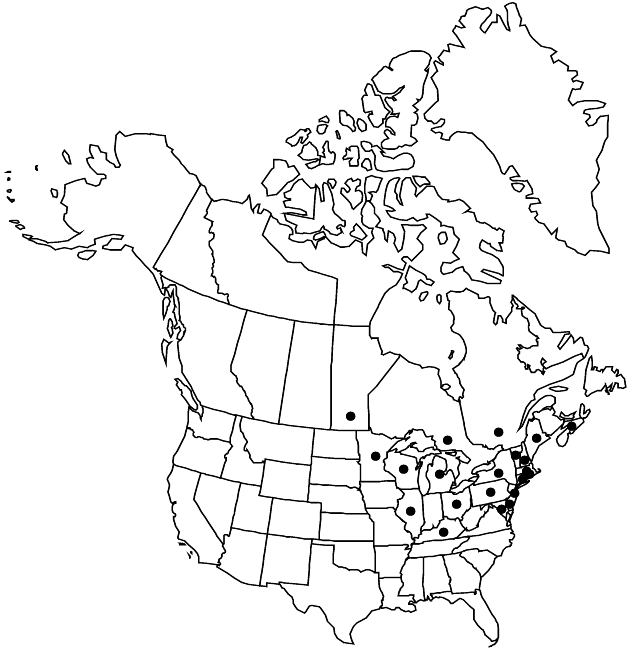Difference between revisions of "Artemisia pontica"
Sp. Pl. 2: 847. 1753.
FNA>Volume Importer |
imported>Volume Importer |
||
| (5 intermediate revisions by 2 users not shown) | |||
| Line 8: | Line 8: | ||
}} | }} | ||
|common_names=Roman wormwood;green-ginger;armoise de la mer Noire | |common_names=Roman wormwood;green-ginger;armoise de la mer Noire | ||
| + | |special_status={{Treatment/ID/Special_status | ||
| + | |code=I | ||
| + | |label=Introduced | ||
| + | }} | ||
|basionyms= | |basionyms= | ||
|synonyms= | |synonyms= | ||
| Line 24: | Line 28: | ||
|elevation=100–500 m | |elevation=100–500 m | ||
|distribution=Man.;N.S.;Ont.;Que.;Conn.;Del.;Ill.;Ky.;Maine;Md.;Mass.;Mich.;Minn.;N.H.;N.J.;N.Y.;Ohio;Pa.;R.I.;Vt.;Wis.;Eurasia. | |distribution=Man.;N.S.;Ont.;Que.;Conn.;Del.;Ill.;Ky.;Maine;Md.;Mass.;Mich.;Minn.;N.H.;N.J.;N.Y.;Ohio;Pa.;R.I.;Vt.;Wis.;Eurasia. | ||
| + | |introduced=true | ||
|discussion=<p><i>Artemisia pontica</i> has finely dissected gray foliage and is widely planted as an ornamental. It escapes locally; it has not been reported as problematic. The only species with which it has been confused in North America is <i>A. abrotanum</i>, which has dark green (not gray) foliage.</p> | |discussion=<p><i>Artemisia pontica</i> has finely dissected gray foliage and is widely planted as an ornamental. It escapes locally; it has not been reported as problematic. The only species with which it has been confused in North America is <i>A. abrotanum</i>, which has dark green (not gray) foliage.</p> | ||
|tables= | |tables= | ||
| Line 33: | Line 38: | ||
-->{{#Taxon: | -->{{#Taxon: | ||
name=Artemisia pontica | name=Artemisia pontica | ||
| − | |||
|authority=Linnaeus | |authority=Linnaeus | ||
|rank=species | |rank=species | ||
| Line 48: | Line 52: | ||
|publication title=Sp. Pl. | |publication title=Sp. Pl. | ||
|publication year=1753 | |publication year=1753 | ||
| − | |special status= | + | |special status=Introduced |
| − | |source xml=https:// | + | |source xml=https://bitbucket.org/aafc-mbb/fna-data-curation/src/2e0870ddd59836b60bcf96646a41e87ea5a5943a/coarse_grained_fna_xml/V19-20-21/V19_922.xml |
|tribe=Asteraceae tribe Anthemideae | |tribe=Asteraceae tribe Anthemideae | ||
|genus=Artemisia | |genus=Artemisia | ||
Latest revision as of 19:57, 5 November 2020
Perennials, 40–100 cm, somewhat aromatic; rhizomes creeping, woody. Stems relatively numerous, erect, brown, mostly simple (brittle, bases woody) canescent or glabrate. Leaves cauline, grayish green; sessile (proximalmost short-petiolate); blades triangular to ovate, 1–5 × 1–3 cm, 2–3-pinnatifid (lobes 0.5–1 mm wide, acute), faces pubescent (abaxial) or hairy to glabrate (adaxial). Heads (nodding) in paniculiform arrays 10–22 × 2–4 cm. Involucres spheric, 1.5–2(–3) mm. Phyllaries (subequal) linear, hairy. Florets: pistillate 10–12; bisexual 40–45; corollas pale yellow, 0.2–0.3 mm, sometimes gland-dotted (stigma lobes relatively short, not emerging from tubes, short-ciliate). Cypselae ellipsoid (angled), 0.1–0.2 mm, glabrous. 2n = 18.
Phenology: Flowering late summer–fall.
Habitat: Disturbed areas, valleys, shaded thickets
Elevation: 100–500 m
Distribution

Introduced; Man., N.S., Ont., Que., Conn., Del., Ill., Ky., Maine, Md., Mass., Mich., Minn., N.H., N.J., N.Y., Ohio, Pa., R.I., Vt., Wis., Eurasia.
Discussion
Artemisia pontica has finely dissected gray foliage and is widely planted as an ornamental. It escapes locally; it has not been reported as problematic. The only species with which it has been confused in North America is A. abrotanum, which has dark green (not gray) foliage.
Selected References
None.